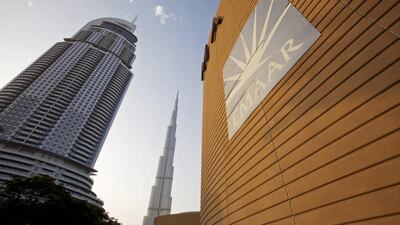Some retail shareholders in Emaar Properties fear they will be frozen out of the forthcoming initial public offering of its malls business by international institutions favoured by the company's army of advisers.
Emaar will employ eight investment banks as advisers or book runners on the Dh8 billion to Dh9bn IPO, now scheduled for September on the Dubai Financial Market. The marketing of the issue will be heavily skewed towards US and European investors, one adviser said on condition of anonymity.
“It will be listed only on DFM but the focus will be on institutions. There will be no special pre-emption arrangement for existing Emaar shareholders and [there is] a risk there will not be enough shares to go around for retail investors. The allocation between institutions and retail has not been finally decided, but it will be far more towards institutions,” the adviser said.
That will frustrate some retail investors. The IPO is likely to generate intense interest in the UAE and the region, with Emaar malls seen as a proxy for Dubai’s booming hospitality and retailing industries.
Emaar was responsible for two of Dubai’s best known landmarks – Burj Khalifa and The Dubai Mall.
“A lot of people would be angry at that [focus on institutional investors],” said one Emaar shareholder, who did not wish to be identified. “We’ve all known this was coming for a while now, and it looks like the little man will be left out in the cold. Also, what happens to the valuation of the remaining part of Emaar?”
Emaar has been given exemption from normal DFM rules to sell less than 55 per cent of its 100 per cent holding in the malls business. It is now expected it will sell between 25 and 30 per cent of the equity, making it the biggest IPO in Dubai since DP World’s in December 2007, and the biggest ever on the DFM.
Three big American banks will market the IPO outside the region: Morgan Stanley, JP Morgan and Bank of America; while HSBC, Emirates NBD, National Bank of Abu Dhabi and EFG Hermes have also been retained.
The main financial adviser is Rothschild. An executive there declined to comment.
“The allocation between institutional and retail has not been finalised yet, but it will still be a big event in local terms,” said Mohamed Ali Yasin, the managing director of NBAD Securities. “If it’s a 60-40 split in favour of institutions, for example, that makes more than Dh3bn for local markets.”
Existing Emaar shareholders will still retain an interest of up to 75 per cent of the new company after the IPO, he pointed out.
The Emaar chairman, Mohamed Al Abbar, said in March that the malls business would seek a listing on the London Stock Exchange and the Nasdaq Dubai market. But insiders said his preference was always to go on the DFM, as long as the market’s stringent rules on the size of the float, capital sell-down and book building could be changed to meet Emaar’s requirements.
The company is 29 per cent owned by Investment Corporation of Dubai, according to ICD’s recent bond prospectus, with the rest spread across a range of mainly local investing institutions and retail investors, including some high net worth individuals.
Emaar’s malls, retail and hospitality businesses have emerged as the main driver of growth at the company. Last year, revenue from these businesses was Dh4.8bn, or 46 per cent of the company’s total.
fkane@thenational.ae
Follow us on Twitter @Ind_Insights

